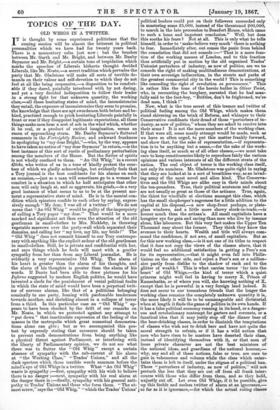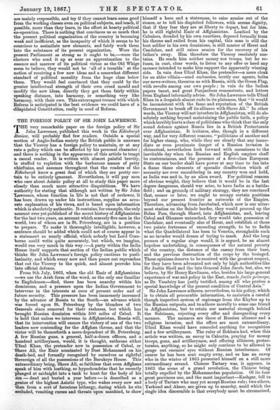TOPICS OF THE DAY.
OLD WHIGS IN A TWITTER.
IT is thought by some experienced politicians that the coming session will be almost the bitterest in political personalities which we have had for twenty years back. There is a momentary calm just now ; but the brushes between Mr. Garth and Mr. Bright, and between Mr. Danby Seymour and Mr. Bright,—a certain tone of trepidation which marks the speeches of Liberals hitherto thought decided Liberals, like Mr. Neate,—a secret tradition which pervades the party that Mr. Gladstone will make all sorts of terrible de- mands on their valour and self-devotion to which they do not feel at all like being responsive,—a disposition to be comfort- able if they dared, painfully interfered with by not daring, and yet a very decided indisposition to follow their leader in a strong fight for that unknown quantity, the working class,—all these hesitating states of mind, the inconsistencies they entail, the exposure of inconsistencies they seem to promise, the knowledge that there are apt swordsmen both before and be- hind, practised enough to prick hesitating Liberals painfully in front or rear if they disappoint legitimate expectations, all these things make men hear a sort of sob in the wind which, whether it be real, or a product of excited imagination, seems an omen of approaching storm. Mr. Denby Seymour's fluttered comments in the Fortnightly Review, and awkward frankness in apologizing to "my dear Bright,"—who, by the way, appears to have taken no notice of "my dear Seymour" in return,—is the best instance of this sort of rustle of preliminary perturbation among the members of the House. Bat the flutter of spirits is not wholly confined to them. "An Old Whig," in a recent Globe, who writes of us in a tone of kindly protest the cour- tesy of which we gladly acknowledge, but evidently feels that a Tory journal is the best confidante for his alarms on such an occasion,—just as a man will sometimes go to a woman for comfort in a situation in which he half anticipates that other men will only laugh at, and so aggravate, his griefs,—is a very good instance of what seems to us to be at the present mo- ment a representative state of mind. He is in the mental con- dition which spinsters confide to each other by saying, expres- sively enough "My dear, I was all of a twitter !" We do not mean that "An Old Whig" would be guilty of the impropriety of calling a Tory paper "my dear." That would be a more marked and significant act than even the attention of the old gentleman in small-clothes to Mrs. Nickleby, in throwing vegetable marrows over the party-wall which separated their domains, and calling her "my love, my life, my bride !" The "Old Whig" does not commit himself to our Tory contempo- rary with anything like the explicit ardour of the old gentleman in small-clothes. Still, he is private and confidential with her, and says things which he feels will meet with a gentler sympathy from her than from any Liberal journalist. He is evidently a very representative Old Whig. The alarm of his heart is greater than the alarm of his thoughts, and the alarm of his thoughts is greater than the alarm of his words. If Dante had been able to draw pictures for his Inferno suggested by modern English politics, he would have invented a circle for the punishment of venial political faults in which the state of mind would have been a perpetual twit- ter of nervous alarms, like that of a politician belonging nominally to one party, leaning with pardonable tenderness towards another, and shrinking almost in a collapse of terror from a third. In this particular case an "Old Whig" ap- pears to have been shocked by the drift of our remarks on Mr. Neate, in which we protested against any attempt to "put down" that inarticulate expression of the feeling of the masses in the metropolis which great numerical demonstra- tions alone can give ; but as we accompanied this pro- test by expressly stating that measures should be taken to prevent such demonstrations from being anything like a physical threat against Parliament, or interfering with the liberty of Parliamentary opinion, we do not see what there was to flutter the "Old Whig" except a certain absence- of sympathy with the sub-current of his alarm at "the Working Class," "Trades' Unions," and all the dark spectres which these terrible words summon before the mind's eye of Old Whigs in a twitter. What "An Old Whig" wants is sympathy ;—first, sympathy with his wish to believe there is no danger ;—next, sympathy with his real alarm at the danger there is ;—finally, sympathy with his general anti- pathy to Trades' Unions and those who form them. "The ut- most screw," says the "Old Whig," "which the Trades' Unions' political leaders could put on their followers succeeded only in mustering some 25,000, instead of the threatened 200,000; to march in the late procession to Beaufort House, which came to such a lame and impotent conclusion." Well, but does this soothe his fears ? Not at all. This is only what he tells himself, in order to make-believe very much' there is nothing to fear. Immediately after, out comes the panic from behind the consolation that did not console :—" That is a mere frac- tion of the working masses of London, and to this fraction thus artificially put in motion by the old organized Trades' Unionist perturbers of industry, as now of politics, are we to. concede the right of making multitudinous demonstrations, at their own sovereign indiscretion, in the streets and parks of the greatest commercial city in the world ? This is something- like conceding the right of revolution en permanence." This is rather like the tone of the heroic butler in Oliver Twist, who, in recounting the burglary, narrated that he had man- fully said to the foot-boy, " Biittles, don't be frightened, we're dead men, I think I" Now, what is the true secret of this tremor and twitter of political feeling among the Old Whigs, which makes them stand shivering on the brink of Reform, and whimper to their Conservative confidants their dread of those "perturbers of in- dustry, as now of politics," whom they are asked to receive into their arms ? It is not the mere numbers of the working class. If that were all, some manly attempt would be made, such as we have so often urged, to put this matter frankly forward,. and show that, for the sake of representation,—if representa- tion is to be anything but a name,—for the sake of the work- ing class itself, as much as of all other classes,—we must take. care to keep constituencies likely to reproduce fairly the various opinions and various interests of all the different strata of the nation. The real object of terror is the working class itself,. not only its numbers. Mr. Gladstone was quite right in saying that they are looked at in a sort of breathless way, as an invad- ing army of the most novel and alien kind. The Conserva- tives and the Old Whigs are alike easy in their minds about the ten-pounders. True, their political acuteness and reading, are not usually so great as those of the artisans. True, again, the thirst for windfalls at elections amongst this class, which has the small shopkeeper's eagerness for a little addition to the capital at his disposal,—a new shop-front perhaps, or plate. glass windows, and a little more showy stock-in-trade,—is keener much than the artisan's. All small capitalists have a hungrier eye for gain and saving than men who live by ineome alone, like labourers. But this very fact makes the Upper Ten Thousand easy about the former. They think they know the avenues to their hearts. Wealth and title will always com- mand the confidence, if not awe, of small capitalists. But as. for this new working class,—is it not one of its titles to respect that it does not copy the views of the classes above, that it would feel no additional satisfaction in getting a Peer's son for its representative,—that it might even fall into Philis- tinism on the other side, and reject a Peer's son or a million- aire partly from dislike to the shadow of rank and to the. glitter of wealth ? This is what carries terror far into the heart' of Old Whigs,—the kind of terror which a quiet princess might well feel in having to marry X, Prince of Kamschatka, or of where you will, she knowing nothing of X, except that he is powerful in a very foreign land indeed. It does not occur to our tremulous friends that the longer the working class remains the completely unknown quantity it is,, the more likely it will be to be unmanageable and dictatorial when at length it finds the game of politics in its own hands. If it has a false political economy running in its head, or a danger- ous and revolutionary contempt for garters and coronets, or a fanatical idea that it may justly stop off the dinner beer of the beer-drinking classes, in order to diminish the temptations of classes who wish not to drink beer and have not quite the moral strength to refrain, or if it has a wild notion that men who have risen to be masters have deserted their class, instead of identifying themselves with it, or that men of loose private character are not the best ministers of the national ideas, and guardians of the national honour,— why, any and all of these notions, false or true, are sure to gain in vehemence and volume while the class which enter- tains them is left to itself, under the stigma of a political ban. These "perturbers of industry, as now of politics," will not perturb the less that they are cut off from all frank inter- course with those who differ from them, and as they hold,. unjustly cut off. Let even Old Whigs, if it be possible, give up this feeble and useless twitter of alarm at an ignorance,— so far as it is ignorance,—for which the actual ruling classes are mainly responsible, and try if they cannot learn some good from the working classes even on political subjects, and teach, if possible, more than they learn, in the effort at hearty political co-operation. There is nothing that convinces us so much that the present political organization of the country is becoming -weak and inefficient, as the incapacity of which it seems to be conscious to assimilate new elements, and fairly work them into the substance of its present organization. Were the present Parliament as strong as it ought to be,—were the electors who send it up as near an approximation to the essence and marrow of its political virtue as the Old Whigs seem to believe, they would not be 'all of a tremble' at the notion of receiving a few new ideas and a somewhat different standard of political morality from the huge class below them. They would feel convinced that they could by the greater intellectual strength of their own creed mould and modify the new ideas, directly they got them fairly within speaking distance, into harmony, or something very like harmony, with their own. This extravagant tremor with which Reform is anticipated is the best evidence we could have of a dilapidated Constitution, really in need of Reform.































 Previous page
Previous page